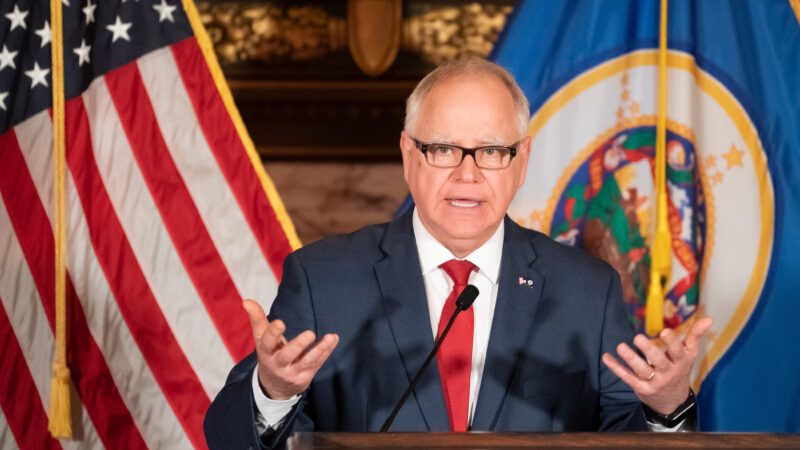Minnesota Gov. Tim Walz, Darling of the Progressive Left, Is Harris' Running Mate
Walz's track record as governor includes pushing for higher taxes, legalizing marijuana, and asking neighbors to spy on one another during the COVID-19 pandemic.

Traditionally, major party presidential campaigns try to pivot towards the center as the summer wanes, the conventions occur, and the election nears.
But if the selection of their running mates is any indication, both former President Donald Trump and Vice President Kamala Harris seem to believe it's more important to double down on their respective party's versions of economic progressivism.
Harris named Minnesota Gov. Tim Walz as her running mate on Tuesday, rounding out her hastily assembled presidential ticket. Walz was the favored choice for many left-wing Democrats—Sen. Bernie Sanders (I–Vt.) and Jacobin magazine both lobbied on his behalf in recent days—who saw him as a better candidate than Pennsylvania Gov. Josh Shapiro, the centrist option who was the widely perceived favorite in Harris' veepstakes.
As governor since 2019, Walz has steered Minnesota towards the left on a variety of economic and social issues. He signed into law a "California-style" environmental bill aimed at cutting emissions and transitioning the state to 100 percent clean energy by 2040. He's expanded access to free college for low-income residents of the state and has tightened the state's gun laws.
Walz campaigned in 2018 on a promise to raise Minnesota's gas tax. He has also proposed a new individual income tax rate of 10.85 percent—higher than the current top tax bracket of 9.85 percent, which is already one of the highest state income taxes in the country—on Minnesotans who earn more than $1 million, and he's called for a new tax on capital gains and dividends.
None of those measures have passed, thanks to the state legislature, but Walz has been eager to argue that the government should be able to gobble up more of wealthier Minnesotans' assets. "We can cut taxes for the middle class without cutting taxes for massive corporations and the wealthiest people in Minnesota. They don't need a tax cut," Walz said in his 2022 State of the State address.
As is sometimes the case, Walz's progressive tendencies have overlapped with libertarian interests on topics like criminal justice reform and drug legalization. He signed the bill that legalized marijuana in Minnesota in 2023, and in 2019 Walz signed legislation to reduce the use of solitary confinement in Minnesota prisons. He's also signed a major permitting reform bill.
But those attempts at limiting the government's power over people sit awkwardly alongside the worst part of Walz's record: his heavy-handed approach to the COVID-19 pandemic. With Walz's approval, public schools in Minnesota required children as young as 5 years old to be masked all day.
Under his watch, Minnesota's public health authorities set up a hotline to allow people to report their neighbors for violating the state's strict social distancing rules, which included the threat of 90 days in jail for violators. When Republicans in the state legislature called for the hotline to be shut down, Walz defended it. He also told pandemic-weary Minnesotans to stay away from relatively safe outdoor activities like spending time on the state's famous lakes.
The Harris campaign likely sees Walz's rhetorical skills as one of his key strengths. He's the originator of the idea to label populist conservatives like Sen. J.D. Vance (R–Ohio) as "weird"—an effective attack since it's pretty obviously true, if petty.
But Walz's folksy Midwestern charm doesn't always hit the mark. On at least one occasion, he's described socialism as being akin to "neighborliness." Try pitching that message to Florida voters who fled Castro's Cuba—or, for that matter, any American with a passing understanding of history or economics. (That line gets even weirder when you recall that pandemic era hotline. What exactly does Walz think neighborliness means?)
Ultimately, Harris' selection of Walz is for Democrats a mirror image of Trump picking Vance as his running mate. Both are Midwesterners who believe the government should spend more and more aggressively tell Americans how to live. There is, unfortunately, very little difference between believing that someone should pay more in taxes because they choose not to have kids or because they happen to be financially successful—it's just a question of, as Vance might put it, deciding which perceived enemies you want to punish with state power.
Vance wants the government to be more like a parent, while Walz wants it to be your nosy neighbor. Voters who realize it can't be either of those things won't find much to like about either major party vice presidential nominee this year.


Show Comments (237)